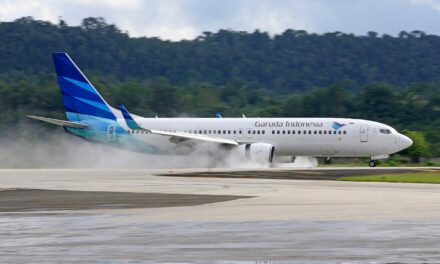Indonesia is leading the digitisation charge amongst its peers, boasting the lion’s share ASEAN’s digital economy, but its future success is not without its challenges.
Indonesia’s digital economy has swelled over the last decade and is expected to continue to do so.
As the country with the largest digital economy in Southeast Asia, Indonesia’s digital economy is projected to reach USD77 billion in 2022 and will continue to grow to between USD220 billion and 360 billion in 2030, according to venture capital firm East Ventures’ Digital Competitiveness Index 2023.
In 2021, the size of Indonesia’s digital economy accounted for about 42% of ASEAN’s digital economy, according to a different report by Economic Research Institute for ASEAN & East Asia released early 2023.
The digital economy refers to the economic activity that results from everyday online connections among people, businesses, devices, data, and processes. It encompasses all the economic transactions that are enabled by digital technologies, and includes activities such as e-commerce, online advertising, digital media, social networking, digital payments, and the sharing economy.
Indonesia’s extraordinary digital rise has defied its challenging geography, being an archipelagic country with 38 provinces and 157 cities. On the other hand, its large youth demographic is helping its digital drive.
“The growth potential of Indonesia’s digital economy is inseparable from demographic factors, as Indonesia is the country with the largest population in Southeast Asia and fourth largest in the world,” East Ventures said.
Indonesia has a population of about 275.0 million, while the number of internet users in the country was at 204.7 million in January 2022, according to East Ventures. This shows an increase of 54% from 132.7 million internet users in 2018 in just four years.
Higher digital penetration increases the opportunities for more transactions. This poses strong synergies with Indonesia’s strong sense of entrepreneurship, with the country coming in 5th globally for the sheer number of startups as of December 2022.
Indonesia’s digital economy does face some challenges, however.
“Digital businesses are facing what is called a ‘tech winter’, in which start-ups are likely to experience slowdowns or even bankruptcy,” ERIA said.
This follows a constrained global outlook which is smothering venture capital funding. Global venture funding reached USD415.1 billion in 2022, marking a 35% drop from a record USD638.4 billion in 2021, according to private equity firm CB Insight’s State of Venture 2022 Report, released early January 2023.
Internally, Indonesia still needs to work on its digital literacy levels. According to the IMD World Digital Competitiveness Ranking 2022, Indonesia’s digital literacy ranked 51st out of 63 countries.
Although there was an increase in ranking compared to the previous year, when the country came in at 53rd place in 2021, neighbouring countries such as Singapore, at 3rd place; Malaysia, at 31st; and Thailand, at 40th, still have higher levels of digital capability.
Digital literacy refers to the ability to access, evaluate, and use information and communication technologies effectively and safely.
Cybersecurity risks also come hand in hand with digitisation, which will endanger companies and customers. In 2021, the National Cyber & Crypto Agency, estimated economic losses of IDR14.2 trillion, or around USD958.9 million, due to cyberattacks and reported that 22% of Indonesian firms were experiencing cyberattacks.
Despite all these challenges, both the government of Indonesia and the private sector have launched various initiatives to support Indonesia’s growing digital economy.
These initiatives come in the form of start-up investments, telecommunications infrastructure, and a general initiative to improve the ease of doing business.
This includes a drive towards e-governance, where mobile apps and web platforms will be used for the rollout of services to the public, and smart cities.
The “100 Smart Cities Movement” is an ambitious plan to address urbanization issues using advanced technologies. A smart city is a city that uses advanced technologies and data analytics to improve the quality of life for its citizens and to enhance the efficiency of urban services and infrastructure.
This will culminate in the country moving its capital city from Jakarta to the island of Borneo, with its new capital dubbed Nusantara.






